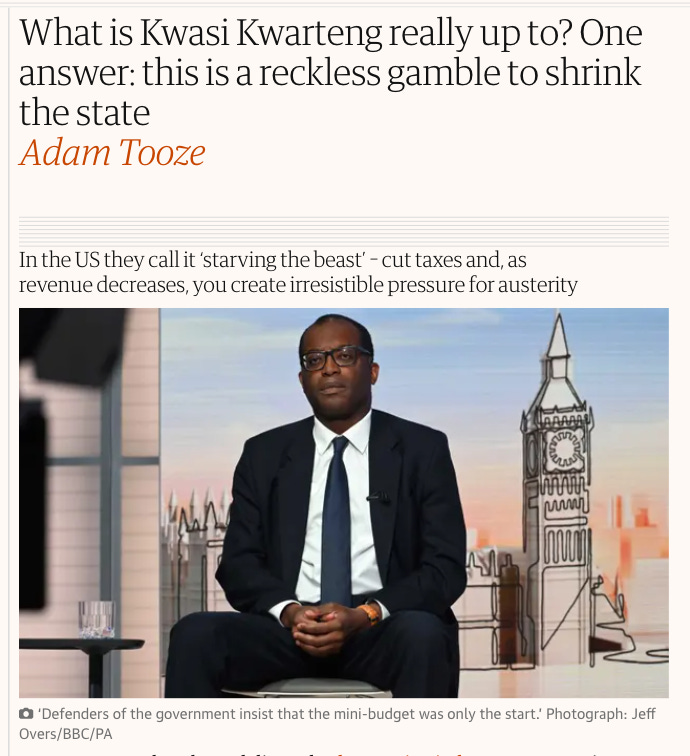Chartbook #156 Project Fear 3.0 - or the gatekeepers and the Tories
As of this morning, sterling is hovering precariously above the historic lows it has plumbed in recent days. UK bonds continue under pressure. Meanwhile, the drumbeat of criticism goes on. Open the FT this morning and it reports that.
The IMF has launched a biting attack on the UK’s plan to implement £45bn of debt-funded tax cuts, urging the government to “re-evaluate” the plan and warning that the “untargeted” package threatens to stoke soaring inflation.
Janet Yellen, US Treasury secretary, said the US was “monitoring developments very closely”. S
Moody’s, the credit rating agency, offered critical commentary
Ray Dalio, the billionaire founder of hedge fund Bridgewater, said the UK was “operating like the government of an emerging country”.
Larry Summers, former US Treasury secretary, on Monday called the policy “utterly irresponsible”
Raphael Bostic, president of the Atlanta branch of the Federal Reserve, who this week warned that the UK’s plan increased economic uncertainty and raised the odds of a global recession.
Summarizing it all, Jason Furman, former economic adviser to Barack Obama, and a vigorous presence on Twitter wrote:
“I can’t remember a more uniformly negative reaction to any policy announcement by both economists and financial markets than the UK’s policy.”
What puzzles me about all these remarks, is not the criticism as such. Any reasonable person should regard a 45 billion pound tax give away for better-off Brits as a travesty. What I am curious about is how the critics of the UK government imagine themselves to be positioned in relation to Truss, Kwarteng and co.
It is one thing to write about your enemy with a view to diagnosing what their project might be. Trying to figure out what they are up to, is important for purposes of realism. What might be their plan? What should we expect next? That is the spirit of my Guardian piece.
The risk in this approach is that you over-interpret your enemy and ascribed to them too much intentionality. In the case of my Guardian article, the title, as usual overstates the point.
I am not sure that Kwarteng and team intended to produce a crisis that will supercharge their drive to slash public spending. But cutting government spending is clearly their plan. They have effectively said as much. And we should expect them to exploit the situation to pursue that goal and be braced for that.
The important point is that in diagnosing your enemy the point is not to correct their behavior. The point is to defeat them.
You are engaged not in a pedagogic exercise, but in reconnaissance. The point is to expose who they are and what they are up to. The point is to help those of us who are opposed to them to be clearer in our judgements and tactics.
It is quite a different thing to write about the Truss government and the mess it is making as though you imagine that your criticism will make a difference, as though the aim of the game is persuasion and improvement. What I wonder do all these highly esteemed sources of economic expertise imagine their exchanges with Downing Street to be about? Who do they think they are talking to? Who, in fact, would imagine sitting down with these people to talk at all? How could you keep a straight face?
This a government of Tory hardliners trying to define the third iteration of post-Brexit Tory identity - May, Johnson, Truss. This is a government that thinks nothing of putting the Northern Irish agreement in play. When they gave away 45 billion to those on top incomes, they were under no illusions. They knew what they were doing. They know it will increase inequality. No harm in that as far as Truss is concerned. Will this drive interest rates up? Of course it will. They appear to relish that too.
So what, given who Truss, Kwarteng et al are, what is the purpose of the drumbeat of opprobrium?
The most plausible reading is that it is a return to the agenda of Project Fear - the campaign of elite consensus-building and intimidation that helped to stop the Scottish independence bid in 2014, but failed miserably to cow the Brexiteers in 2016. The fire and brimstone that was promised in 2016 did not arrive. Perhaps now, six years on, the markets are delivering the long overdue punishment. As in 2016, negative remarks from the great and the good across the pond can’t hurt (though that is debateable in the British context).
But, if that is the objective, you have to ask yourself two things.
Will the intimidation actually work? Isn’t it, in fact, more than likely that Truss’s government will survive the shock, at least in the short run. The UK institutions of monetary and fiscal sovereignty, sterling’s residual status as a reserve currency, the high-functioning markets in gilts will see them through, once again. They are not actually a fragile EM on the edge of regime change. They do not have the constitutional and political issues of the eurozone or the redenomination risks that haunt Italy to deal with.
If you are expecting the markets to deliver the coup de grace and bring the Tories down in flames, I fear you will be disappointed once again. And crying wolf has a price. They may even emerge emboldened, as Johnson did from 2016.
Or, on the other hand, imagine that the intimidation does work. What if the Tories do turn tail and retreat from their policy and return to a more reasonable path. Who are you if you want that? The median British homeowner and voter?
The trade offs for the British population who will suffer the consequences of this policy are all too real. But to adopt this path of “least harm”, is profoundly unpolitical. It imagines that a Tory government, or any other government for that matter, is in the business of pursuing some utilitarian maximum and are open to persuasion about how best to do that. They clearly are not. So why would anyone who wants so see the back of this discredited mob, shed any tears over the fact that they seem bent on crashing the UK housing market? It will hurt, but is there any surer way to bring about their end?
It is a tough choice. Advocating catastrophe is a difficult position to be in. It does not come naturally to policy people who believe in solutions.
In any case, I fear that most of the commentary does not, in fact, seriously weigh this dilemma at all. That is because it is not, in fact, engaged in the fight for the future of the UK. It does not matter very much to Janet Yellen or Larry Summers, one way or another, whether Labour or the Tories rule in Britain. They have bigger fish to fry.
The most straight forward logic is the functional and crassly economistic logic invoked by Bostic. Market instability is bad. Why? Because instability cause uncertainty. Uncertainty is bad for global investment and if it is bad for investment it is bad for growth.
That is, indeed, a reason for central bankers, of the most unpolitical variety, to worry. The reassuring thing, presumably, is that the UK is not large enough to matter very much. Perhaps the UK situation will even serve a useful function in demonstrating to Meloni and her crew the risks of misbehaving.
Beyond this kind of truly economistic logic, what is at play is something that is not so much political as to do with hegemony - the struggle over the overarching ideas that govern and frame political choices. In this mode, what the critics of the UK are performing is the role of gatekeepers, a function, which is at the heart of elite economic policy discourse.
There are global norms of reasonable policy to uphold. Nowadays these include an overriding concern for inflation, but also a rather prim concern for inequality. Both those concerns rule out the kind of flagrant give-aways that Kwarteng and Truss are so openly indulging in. Seen in this light, Project Fear is best seen not so much as an actual act of intimidation as rather a ritualistic discourse through which the guardians of norms reassure themselves and the rest of the world of who is in charge, and what the rules are.
The commentators position themselves as physics teachers overseeing a public lesson in physics. There is gravity. The UK is defying that law. It will crash land. Regardless of the politics it is the laws of economics that need to be respected.
In fact, as recent UK history demonstrates all too clearly, the world of social and economic life is more malleable than that. It is not law-like in any simple sense, but shot through with contradictions, conflicts, double standards, hypocrisy, insanity and malice, all of which the gatekeeping and the gatekeepers with their tidy-minded logic help to obscure and, in so doing, to perpetuate.
To be trapped between hegemonic opprobrium and the deep-blue nightmare of the Tories is a horrible spot to be. Where is the alternative? Clearly the answer ought to be the Labour Party. But what have they chosen to do? Their answer to this moment of national crisis is to position themselves as the party of “sound money”, in other words as the best student in an introductory class in macroeconomics co-taught by the IMF, Janet Yellen and Larry Summers. The tactical temptation is obvious. What will be the strategic price they pay?
******
I love writing this newsletter. It goes out for free to tens of thousands of readers around the world. But what sustains the effort are voluntary subscriptions from paying supporters. If you are enjoying the newsletter and would like to join the group of supporters, there are three subscription models:
The annual subscription: $50 annually
The standard monthly subscription: $5 monthly - which gives you a bit more flexibility.
Founders club:$ 120 annually, or another amount at your discretion - for those who really love Chartbook Newsletter, or read it in a professional setting in which you regularly pay for subscriptions, please consider signing up for the Founders Club.
Several times per week, as a thank you, all paying subscribers to the Newsletter receive the full Top Links email with great links, reading and images.
To join the supporters club, click here:





